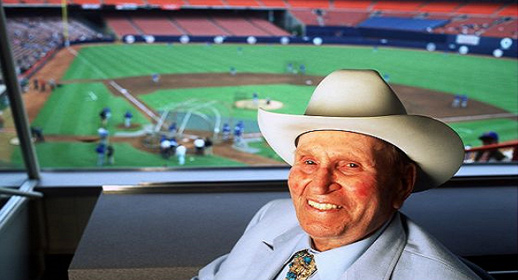


The Hall of Fame Case for Gene Autry
Posted September 29, 2016

Columnist David Krell wrote a thoughtful column in The Sports Post where he makes a fine argument explaining why Gene Autry should be in the Baseball Hall of Fame. We whole heartedly agree and wanted to share this with you. And it was extra nice to have this article posted on Gene Autry's 109th birthday.

Originally Posted September 29, 2016
By: David Krell of The Sports Post
Gene Autry wore many hats, proverbially speaking, besides the cowboy dome piece in his movies—owner of Los Angeles television station KTLA from 1963 to 1982, original singer of the Christmas standard Rudolph the Red-Nosed Reindeer, and Army Air Corps officer and Air Transport Command pilot during World War II. Melody Ranch, a 110-acre site formerly known as Monogram Movie Ranch, also fell under his aegis; he bought it in 1953, sold nearly 100 acres, and used the remaining land for Western movies and television series. He had a radio show called, appropriately, Gene Autry's Melody Ranch; his horse, Champion, also had a show – The Adventures of Champion. Radio stations, television stations, a rodeo, and a record company populated his portfolio as well.
Baseball fans, however, knew Autry primarily as the man who planted a Major League Baseball flag in Orange County, California; Autry, once a part-owner of the Pacific Coast League's Hollywood Stars, was the first owner of the California Angels ball club – originally named Los Angeles Angels – which had its first season in 1961.
His journey to ownership began, as financial successes often do, in the wake of disappointment. When the Los Angeles Dodgers switched radio broadcasters from Autry's KMPC to rival KFI in 1959, an opportunity emerged. A new American League franchise in Los Angeles would be a ripe opportunity for KMPC, particularly because of its sports broadcasting pedigree. A former ballplayer raised the ante. "Joe Cronin had known Autry since Gene's barnstorming rodeo days over two decades earlier. Cronin, now president of baseball's American League, wondered if Autry was ready to tame the Wild Wild West's newest franchise in L.A.," wrote Robert Goldman in the 2006 book Once They Were Angels. "Autry jumped at the opportunity. It was a perfect fit, as not only did Autry love baseball, but he also had an impeccable reputation as a businessman and a person of integrity."
And so, the mogul who grew up dirt poor in Oklahoma pioneered American League baseball on the West Coast.
And yet, the icon born Orvon Grover Autry is not in the Baseball Hall of Fame.
His tenure as the Angels' owner spanned decades, from the last days of President Eisenhower to the first days of the Internet becoming a mainstream tool for information. When Autry sold the Angels in 1996, he left a legacy difficult to match and easy to applaud. His length of time made him a baseball fixture. His integrity made him a model of comportment for businessmen.
Tom Yawkey is in the Hall of Fame, and rightfully so. He spearheaded the renovation of Fenway Park in the 1920s.
Walter O'Malley is in the Hall of Fame, which causes havoc in the hearts of Brooklynites, who see O'Malley as a betrayer for moving the Dodgers to Los Angeles. His transit to Los Angeles after the 1957 season paved the way for Autry and other owners to establish teams west of St. Louis, theretofore the westernmost metropolis with a Major League Baseball team.
Barney Dreyfuss is in the Hall of Fame, a membership for the former Pirates owner resulting from many achievements, including being a proponent of the World Series; the Boston Americans and the Pittsburgh Pirates played in the first World Series in 1903.
Gene Autry, is not in the Hall of Fame, despite his steadfast ownership.
Devotion to the fans stands out. Not content to simply have a financial ledger in the black, Autry poured "his vast millions on players who made the club a winner if not a world champion. He attended his final Angels game only 10 days before he died," wrote Myrna Oliver of the Los Angeles Times in Autry's 1998 obituary.
In 1982, the Angels retired 26 as Autry's number to reflect being the "26th Man" on the roster, which has a limit of 25 players. It was a sign of respect that Autry also earned from owners, fans, stadium workers, players, and baseball executives across Major League Baseball. Such is Autry's emotional connection to Angel Nation that the phrase "Win One for the Cowboy" resonates from Angel Stadium to Aliso Viejo, from Santa Ana to San Juan Capistrano.
Cooperstown awaits. Patiently.